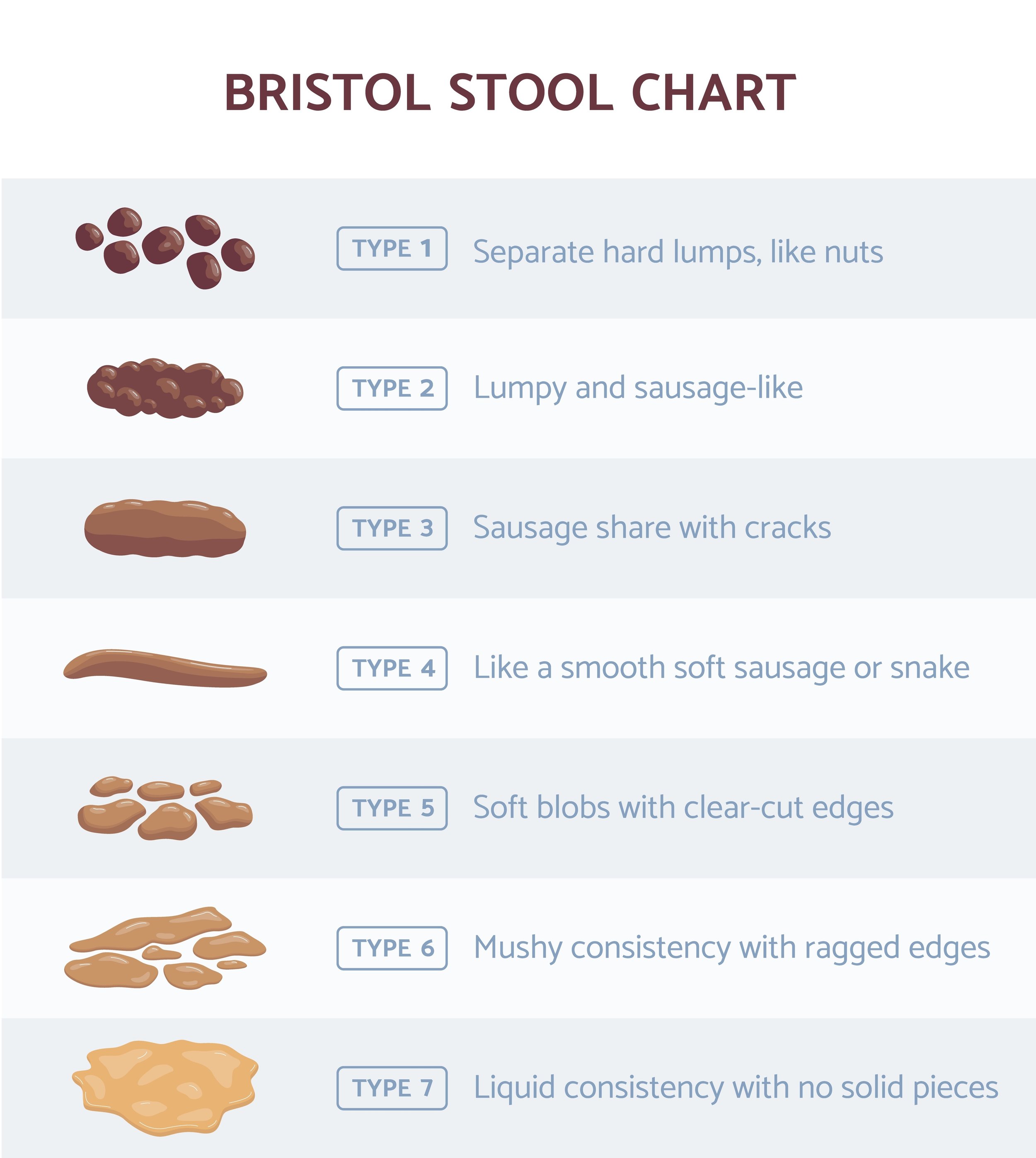The scoop on poop: What's normal?
As naturopaths we love to talk about poo/poop/stools/bowel movements. It’s a fundamental part of the job! And that’s because they are an excellent daily report card for our digestive and gastrointestinal health - which has important ramifications for our overall health and wellbeing.
Stools are made up of dead cells, undigested fibres and bacteria. They are one of our primary elimination channels – removing toxins and waste from the body. When stools deviate from ‘normal’ they are telling us that our digestive and gastrointestinal tract is not operating optimally and, in some cases, can be a sign of more serious conditions.
So when it comes to poop, what’s ‘normal’?
Consistency
The Bristol Stool Chart is a fantastic tool for grading the consistency and form of our stools.
For ‘normal’ stools, we are aiming for something in the range of Bristol Stool Chart Type 3-4. Not too hard, dry or lumpy, bit not too soft.
Colour
When it comes to our stool, we don’t want to see the rainbow so do keep an eye on its colour. The colour of our stool provides important clues to general health and well-being.
For healthy stools we are looking for a medium shade of brown, like chocolate.
White or grey (pale/chalky): If you are experience white or grey stools, this may indicate a lack of bile. Bile salts produced in the liver and stored in our gallbladder give our stool its brown colour. As such, persistent pale stools should be investigated. A naturopath can provide diet and supplement recommendations to address this.
Bright green: Eating a lot of leafy green vegetables can sometimes give your stool a green appearance. If your stool is green and you haven’t been eating leafy veg (or artificial green food colouring), then this should be investigated. It is quite normal for babies for have yellow-green stools.
Black: Stool that has spent longer in the intestines is often darker in colour. Black stool can indicate bleeding from the upper digestive tract, so always consult your doctor. Poorly absorbed iron supplements can also make stools black and cause constipation. Consult your naturopath for a more bioavailable form of iron supplement.
Red: Bright red blood in stool indicates bleeding from the lower gastrointestinal tract or rectum. Consult your doctor. Eating beetroot can also result in red stool and is not cause for concern.
Frequency
When it comes to how often we poop, there is a wide range of ‘common’ and then there is ‘ideal’.
Ideally, we want to be moving our bowels two to three times daily. Not more often than that, and not less than once per day. If we pass stool too frequently, we may not get the opportunity to be breaking down and absorbing nutrients from our food. If we pass stool too infrequently, toxins and waste products that should be eliminated can be reabsorbed through the intestinal tract and recirculate in the body.
Both diarrhea and constipation can have broader health implications and, in all cases, further investigation is required to find and treat the underlying cause. See link here to my scoop on poop blog post talking all things constipation.
Other ‘undesirable’ attributes
Sinking stool: Stool that consistently sinks very quickly can indicate that you are not getting enough fluid and fibre in your diet. This stool is commonly very dark as it has taken longer to move through the gastrointestinal tract.
Floating stool: The occasional floating stool is not something to be concerned about. It may occur due to an increased amount of gas in the stool. Consistently floating stools, however, may be a sign that you are not digesting and absorbing dietary fats properly. This should be investigated as it will influence the absorption of important dietary fats and fat-soluble vitamins and can have broad health implications.
Smelly stool: Foul smelling stool is commonly related to dietary intake and may not be cause for concern. However, persistently foul, smelly stool can also indicate an imbalance of gut bacteria or conditions such as inflammatory bowel disease.
Undigested food in stool: While it is normal to see difficult to digest food, like corn, in stool, we should not regularly see other undigested food particles in our stool. This should be investigated, particularly if there are other issues such as abdominal pain or diarrhea. It is also recommended to eat slowly, chewing your food thoroughly to see if this helps.
Mucous in stool: Our gastrointestinal tract is lined with mucous. It has a protective role as well as making stool easy to pass. Clear mucous is commonly found in stool but tends to be difficult to see, so remains unnoticed. If you start to notice excess mucous or white/yellow mucous it should be investigated to find the root cause as it can indicate inflammation or irritation.
Sandy stool: Sandy/grainy stool may be a sign of high oxalates or oxalate dumping. Oxalates are a compound found in foods like leafy green vegetables, beans, nuts, and seeds. Oxalates bind with calcium in the digestive tract and are excreted out of the body through the urine. High consumption of oxalates can contribute to the formation of kidney stones, and increased levels of inflammation and oxidative stress. When the intake of oxalates is decreased too rapidly it is said to cause ‘oxalate dumping’, a sign of which can include sandy stools. If you have persistent sandy/grainy stools, a naturopath can provide diet and supplements to treat the cause. There are also supplements like glycine and fish oil that should be avoided if you have a problem with oxalates so a full holistic assessment with a naturopath is recommended. If you react to these supplements its a HUGE clue that oxalates may be an issue for you.
Oxalates are also commonly associated with mold. To resolve oxalates issues, mold toxicity and mycotoxins may also need to be addressed.
If you experience unusual consistency, colour or frequency of stools, or any of the other attributes discussed, it is best to seek professional guidance from your doctor or naturopath.
Not only do we love talking about poop, but we love treating gut and poop issues in clinic too! I’d love to help get your bowels moving optimally. Reach out to arrange a consultation for diet, lifestyle, supplement and herbal advice tailored to your individual needs.

